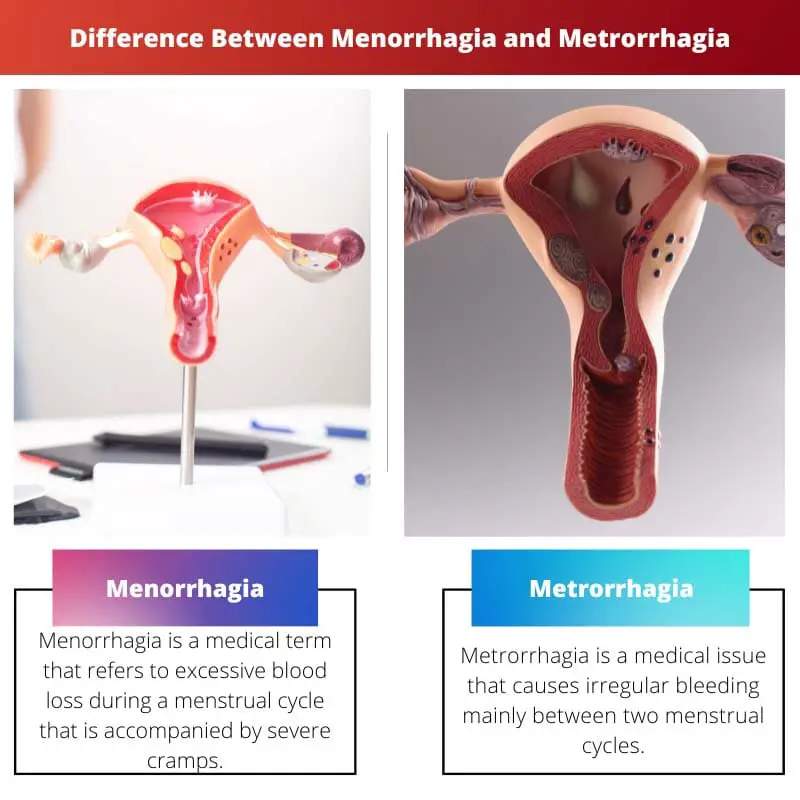Irregular menstrual cycle, prolonged menstrual cycle, severe cramps, etc. during periods can be associated with other diseases sometimes.
Though have heavy menstrual bleeding is common among women but prolonged menstrual bleeding or getting your periods twice a month are symptoms of other disorders.
One should consult a doctor if facing any kind of irregularity or any other symptoms.
Key Takeaways
- Menorrhagia is characterized by abnormally heavy or prolonged menstrual bleeding.
- Metrorrhagia involves irregular bleeding between menstrual periods.
- Menorrhagia affects the duration and volume of menstrual bleeding, while metrorrhagia disrupts the regularity of the menstrual cycle.
Menorrhagia vs Metrorrhagia
Menorrhagia refers to heavy and prolonged menstrual bleeding. Women with menorrhagia experience periods that last longer than 7 days. Metrorrhagia refers to irregular bleeding that occurs between periods. Women with metrorrhagia may experience light bleeding or spotting or more significant bleeding that lasts for several days.

Menorrhagia affects nearly 10% of total menstruating women. The blood flow during menorrhagia is very heavy and one needs to change several pads/tampons only after an hour or two.
There can be several causes of menorrhagia from hormonal imbalance to uterine cancer.
Metrorrhagia is different from periods and it causes between two consecutive period cycles. The causes of metrorrhagia can be as common as excessive stress as well as the effect of certain medications.
Sometimes underlying health problems like endometritis, cervicitis, thyroid disease, etc. can cause metrorrhagia.
Comparison Table
| Parameters of Comparison | Menorrhagia | Metrorrhagia |
|---|---|---|
| Definition | Menorrhagia is a medical term that refers to excessive blood loss during a menstrual cycle that is accompanied by severe cramps. | Metrorrhagia is a medical issue that causes irregular bleeding mainly between two menstrual cycles. |
| Causes | Excess development of the endometrium, polycystic ovary syndrome, uterine fibroids, etc. | Stress, menopause, birth control pills, blood thinners, fertility treatments can cause metrorrhagia. |
| Symptoms | Unable to control menstrual flow using several sanitary pads, passing very large blood clots, unable to perform daily activities, etc. | Heavy bleeding is caused in between two cycles and may seem like you are getting periods twice a month. |
| Diagnosis | It can be diagnosed by doing an ultrasound, biopsy, pap test, or hysteroscopy. | Blood test, urine test, hormone levels testing, and reviewing any current medications. |
| Treatment | Hormone treatment, birth control pills, resection, and prostaglandin inhibitors are some choices. | Hormonal therapy, treating underlying health conditions, and changing lifestyle. |
What is Menorrhagia?
A very heavy flow of blood during periods is a symptom of menorrhagia. But sometimes heavy flow of blood can be due to other reasons and not something to worry over.
If a very heavy flow of blood is continuing for a long time (prolonged menstrual cycle) and severe cramps then one should visit a doctor at the earliest.
Menorrhagia can be caused by several problems and the most common is hormonal imbalance. The imbalance of hormones such as progesterone and estrogen causes a very thick lining of the endometrial wall and this leads to heavy bleeding.
When ovaries fail to release an egg every month regularly (dysfunction of the ovaries) then the body doesn’t produce progesterone and this leads to menorrhagia.
The development of polyps (small growth on the lining of the uterus) also leads to prolonged menstrual bleeding. Pregnancy complications and inherited bleeding disorders can also lead to the same disorder.
Risk factors related to menorrhagia vary depending on the age of the female and if they have other diseases or not.
In some cases, it can be cured with simple medications and if the medication doesn’t work, surgery is required such as ablation (destroying the endometrium layer) or resection (the uterine lining is removed).
What is Metrorrhagia?
People confuse metrorrhagia with menorrhagia because both are vaginal bleeding. But, metrorrhagia’s causes can be sometimes very harmless and sometimes very fatal.
Most of the time there is an underlying health condition that causes metrorrhagia. You can sometimes find many women complaining that they are getting periods way ahead of the expected data and sometimes twice a month.
In these cases, proper diagnosis should be done to understand if it is metrorrhagia or something else. Most of the time, it is easily curable by medications. The vaginal bleeding during metrorrhagia can be both light and heavy.
Women who are just starting to menstruate can have metrorrhagia because before their periods get regular (ovulation once a month), the exact 28-day cycle takes time to start.
The same happens in the case of menopause as periods become irregular during the perimenopausal phase and then metrorrhagia is common.
If a person suddenly stops or starts taking birth control pills, it causes hormonal changes that can lead to metrorrhagia.
Several underlying health conditions cause metrorrhagia but some of them are common while others are very rare.
These conditions include vaginal inflammation, ovarian cysts, fallopian tube torsion, coagulation disorder, etc. Sometimes metrorrhagia can also be a sign of ectopic pregnancy.
Main Differences Between Menorrhagia and Metrorrhagia
- Menorrhagia occurs in women during the active menstrual phase of life whereas metrorrhagia is more common during the time of menarche and menopause.
- Menorrhagia in women is more common than metrorrhagia.
- Menorrhagia is mainly caused when the ovaries are dysfunctional but metrorrhagia can be caused even by excessive stress and malnourishment.
- Menorrhagia will occur only when you are having periods but metrorrhagia occurs when you are not supposed to get your periods but in the same month.
- Menorrhagia may cause anemia due to excessive blood loss but metrorrhagia doesn’t lead to anemia.





